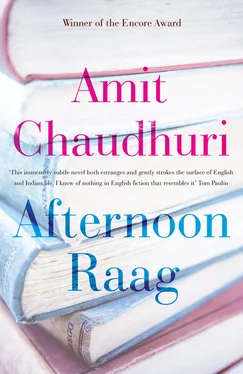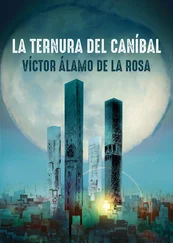Amit Chaudhuri - Afternoon Raag
Здесь есть возможность читать онлайн «Amit Chaudhuri - Afternoon Raag» весь текст электронной книги совершенно бесплатно (целиком полную версию без сокращений). В некоторых случаях можно слушать аудио, скачать через торрент в формате fb2 и присутствует краткое содержание. Год выпуска: 2015, Издательство: Oneworld Publications, Жанр: Современная проза, на английском языке. Описание произведения, (предисловие) а так же отзывы посетителей доступны на портале библиотеки ЛибКат.
- Название:Afternoon Raag
- Автор:
- Издательство:Oneworld Publications
- Жанр:
- Год:2015
- ISBN:нет данных
- Рейтинг книги:3 / 5. Голосов: 1
-
Избранное:Добавить в избранное
- Отзывы:
-
Ваша оценка:
- 60
- 1
- 2
- 3
- 4
- 5
Afternoon Raag: краткое содержание, описание и аннотация
Предлагаем к чтению аннотацию, описание, краткое содержание или предисловие (зависит от того, что написал сам автор книги «Afternoon Raag»). Если вы не нашли необходимую информацию о книге — напишите в комментариях, мы постараемся отыскать её.
Afternoon Raag — читать онлайн бесплатно полную книгу (весь текст) целиком
Ниже представлен текст книги, разбитый по страницам. Система сохранения места последней прочитанной страницы, позволяет с удобством читать онлайн бесплатно книгу «Afternoon Raag», без необходимости каждый раз заново искать на чём Вы остановились. Поставьте закладку, и сможете в любой момент перейти на страницу, на которой закончили чтение.
Интервал:
Закладка:
But strange things happen even in term-time. Once, I remember, someone died, a former boyfriend of one of Mandira’s friends, a young man of twenty-one, a ‘commoner’ of the college; he had died alone in his room, strangely, of a heart attack. At lunchtime, I had seen some students crying, and then, that evening, when Mandira told me the story, the correspondences began to fit. That episode, unknown to most graduates, hung over the college and Mandira’s staircase for about a week. It was about at that time that things began between Mandira and myself, without either or us knowing where they would lead to. She would lock her door and come and sit beside me on the bed. If one of her friends happened to knock, and call out, ‘Mandira!’, we would both be silent; we would listen to the scratching on the notepaper outside, and smile as the person walked away. She wanted very much to make love to me, and at night, after switching off the light, she would lie, small and warm, underneath her blankets. She was completely new to love, unexpectedly bold in her various pleas and demands, and ashamed at the wrong moments. Our blinded gropings were more exploratory than passionate, for both of us were inexperienced, and a little afraid of what was supposed to happen at the end of this act. These were the only moments when we were tolerant of each other’s disabilities and shortcomings. Just above the bed there was a skylight that let a glow into the room, so that we could see each other’s outlines, and the reassuring shapes of certain objects.
18
At the end of Cornmarket Street, near the Lloyd’s Bank, comes a confluence of four roads, making an irregular sort of cross which one could possibly see from an aircraft. There is no centre in Oxford, only different points of reference, from each of which the conception of the city is altered slightly. Thus one never feels completely rooted, and ascending three floors in a building of the New Bodleian Library gives one, before entering the reading-room, a view of Holywell Street from above. One senses, from that window, how distinct and well marked-out each section of the city is, each partially unknown to the other, each potentially undiscovered to its own inhabitants — for, from above, Holywell Street, with its repetitive up-and-down movement of cyclists and pedestrians, the faint white fringe of its pavement, and the houses on either side appearing quite oddly rearranged from this angle, seems, in the disturbing perspective gained by height and distance, continually strange, a place that will never become familiar or old. The orderly, disappearing line of traffic, the activity on the roads, harmonious and self-dispersing, the unreality of the scene and one’s relationship with its unreality, are exposed and encompassed by this view from a third-storey window, which reveals absences between one lane and another, one house and another, untenanted, unexplainable spaces, and that absence over all these, on eye-level with the window, so that the places one has walked through or passed daily lose their known features. It takes something as small and unsuspected as this, a change of view and altitude, to bring one’s foreignness to one’s self, the feeling of being separated from the routines that one thought attached one to the city, of being secretly in transit. Similarly, at the junction of four roads at the end of Cornmarket Street, the minor change in gradient of one of the roads, St Aldate’s, the way it dips downward, so that the line at its end is known to be a false line, a border concealing and sheltering a second and more distant border at that end of the city, marks, in the midst of everything, an unnoticed but real departure. In a city so little known, so full of such instants, such escapes, events and the memory of events become temporary stays; Shehnaz, Mandira’s room, the walks taken together, a meeting with Sharma, reassure one that one has not been in Oxford alone, that one has shared it with others, till the solitary experience of being in transit returns, and friends and acquaintances are borne away by this city, which renews itself, and becomes, once more, strange to oneself. It is the city that remains, a kind of meeting place, modern and without identity, but deceptively archaic, that unobtrusively but restlessly realigns its roundabouts and lanes and landmarks, so that it never becomes one’s own, or anyone else’s.
The long road adjacent to St Aldate’s is the High Street. One of my earliest meetings with Shehnaz was when we ran into each other at the junction, and she was going the opposite way, into High Street, in search of a florist; I hardly knew her then, but on her request, turned back to walk with her. The florist’s was closed, so it must have been evening, one of the long, bright evenings of summer. On both sides of this road are ancient colleges, with grey steps and wooden doors and grim, outdated windows, smooth brown stone walls, clock towers and spires. The gong of the clocks, especially the one at the Cornmarket Street end of High Street, can be heard every hour with great and transparent clarity, and at night, when I would hear the ever-increasing repetition from Mandira’s room, I would become conscious of the strangeness of the place I was about to fall asleep in, of distance, and the suspension of activity. As one walks past the colleges on High Street, one glimpses, through the frame of the doorway, another frame, which marks off the end of the entrance area with the porter’s lodge, noticeboards, and mail-room, broadening out into the first quad with its empty oval or square of green, its generously enclosed, yet strangely liberated, parameter of open air and space, the facade of a building, with the college chapel, behind the green, and a measured rectangle of sky. This is the abbreviated, painting-like view that passers-by have of the interiors of the colleges, and the rest is hidden behind an edifice of stone that is part history and part fantasy, and has little to do with the domestic or working lives of students, and their particular slang or vernacular. Yet the students do not really matter, because within the college walls there is a world — a geography and a weather — that clings to its own time and definition and is changed by no one. In this world, glimpsed briefly by the passer-by through the open doorway, a certain light and space and greyness of stone, and at night, a certain balance of lamplight, stone, and darkness, co-exist almost eternally, and it is the students, with their nationalities and individual features, their different voices and accents, their different habits and attempts at adjustment, their sense of bathos and possession of reality, who, in truth, vanish, are strangely negated, so that, when the passer-by later remembers what he saw, the students seem blurred, colourful, accidental, even touching, but constantly skirting the edge of his vision, while it is possible to clearly and unequivocally recall the dignity and silence of the doorway and the world beyond it.
A little further on, a short distance before Magdalen Bridge, are the Queen’s Lane Coffee Shop and a newsagent’s on the left, and the Examination Schools to one’s right. On certain days in May and June, examinees in black gowns, at half past twelve and five thirty, trickle out, and then overflow, on to High Street from the entrance of the Schools, the women in black skirts and white shirts, some jubilantly holding bouquets in their hands, the men in white shirts and black trousers, faces and outlines merging on the pavement and then separating at street-corners, a young man materializing from the crowd and awkwardly crossing the street in the midst of the traffic, sweethearts, their faces flushed with pride and anxiety, waving madly and then embracing, large groups chattering and breaking up, and other smaller groups held close in serious conference. This is one of the few occasions on which one sees something common to all these faces; before one’s eyes, for the first time, a network of friendships is formed, correspondences that link acquaintances and strangers in one milling and crowded moment, that is already turning into the past, already disintegrating only to be remembered as something so immediate as not to be wholly real; for no one, later, actually knows what it was like at that moment. Common to each, as they emerge, is the nervous or successful air of opera-singers; for each one has been privileged and chosen by Oxford to perform for it; and now that unique and invigorating moment, for better or for worse, is over. On the other side, life at the newsagent’s goes on as before; polite people, such as those one holds the door open for, say ‘Thank you’ and leave with newspapers and sandwiches. By chance, one might pass them on the street a month later, an encounter that does not bring up a memory or a connection, but something in their place, neither a memory or a connection, which causes one’s identity to reconstitute itself. The newsagent’s sells postcards of Oxford, small, shining squares with pictures of colleges, hidden lanes, the Radcliffe Camera, and students on bicycles. The postcards are weightless, but palpable, and when one stops to look at them, they have a recognizability that one’s consciousness of Oxford lacks; they seem more real than the place one has lived in.
Читать дальшеИнтервал:
Закладка:
Похожие книги на «Afternoon Raag»
Представляем Вашему вниманию похожие книги на «Afternoon Raag» списком для выбора. Мы отобрали схожую по названию и смыслу литературу в надежде предоставить читателям больше вариантов отыскать новые, интересные, ещё непрочитанные произведения.
Обсуждение, отзывы о книге «Afternoon Raag» и просто собственные мнения читателей. Оставьте ваши комментарии, напишите, что Вы думаете о произведении, его смысле или главных героях. Укажите что конкретно понравилось, а что нет, и почему Вы так считаете.












